250th anniversary

250th anniversary
May 3
April 29 turned out to be the day when the British Captain James Cook "invaded" Australia 250 years ago on his ship HMS Endeavor. Because of the epidemic and the quarrel between Australia and China over tracing the origin of the virus, the mass media only lightly mentioned Captain Cook in sporadic reports. Of course, the indigenous people still severely criticize the captain for his mass killings and illegal occupation of land to this day, which are unforgivable things. I have lived in Australia for almost 30 years, and except for the unparalleled praise of Cathy Freeman, the 400-meter long-distance race winner at the Millennium Olympics, I have never seen an Aboriginal figure who has dominated the political, business or sports circles. For them, their ancestors were killed, and the land where they were born, grew up, and died here was occupied. Now most people live in poverty and drink all day long. They are people who live on the margins of society below the poverty line and under the bustling city. Protected persons. Cathy Freeman and her parents will never forget the tragic mark of being taken away in their infancy. Compared with the different ethnic groups that live in Australia's major cities and live in harmony with each other, the tragic figure of the Aboriginal people is the most disgraceful page in Australia's history. But the other side of the matter is even more thought-provoking. If Captain Cook had not landed in Australia, what kind of country could the Aboriginal people have built Australia into? History cannot be assumed but can be compared, and Hong Kong is a good example. Australia and Hong Kong both became British overseas colonies in the 18th and 19th centuries. The difference is that in the former, Captain Cook found a large barren land in the southern hemisphere for the British Empire, while in the latter, the Manchu Qing government lost the opium market. A small fishing village ceded by the war and the signing of the Treaty of Nanjing. This small fishing village has become the most active economic and financial center in Asia during the 150-year British colonial system in the last century. It is still the most important channel for funds to enter China today, not to mention the money and technology provided in the early days of reform and opening up. , humanities, talent training and the role of a bridge to connect with the modern civilized world. Australia, a "barren land", transformed under the British colonial rule into a democratic political system, where people live and work in peace and contentment, the economy is prosperous, and different ethnic groups live in harmony.

It’s also 250 years, and something else to remember here is: 2020 is the 250th anniversary of Beethoven’s birth.
Beethoven was born in a small town called Bonn in central and western Germany. Bonn was also moved here from Berlin by the Federal Republic of Germany (West Germany) after World War II due to sensitive geopolitical factors. I left my hometown for the first time more than thirty years ago. When I first arrived in Germany, I was lucky enough to live here. I remember that I would pass the Beethoven bronze statue in the city center when taking the bus to and from school. Due to its age and weathering, the bronze statue was covered in blue, green and green, an azurite color that resembled Chinese splash paint. I still remember that when I first arrived in Germany, in addition to adapting to the residence, language, and food, I also had to adapt to the local cultural environment. Because Beethoven was born in Bonn, Bonn became world-famous, and Bonn also attracted a large number of people. As the capital city, envoys from various countries, cultural celebrities and wealthy businessmen gathered, Beethoven's repertoire was also played the most. I once saw three public and one local TV stations playing Beethoven's music during prime time. I also grew to like classical music from not resisting it at first, to loving Beethoven’s repertoire. Compared with the discoloration of the bronze statue that attracts people's attention due to rain and wind, Beethoven's works have remained timeless and fresh after two and a half centuries, making people never tire of listening to them. Later, I immigrated to Australia, and my life settled down. I had a better audio equipment at home, and I listened to Beethoven's music more. The better sound effects made it easier for people to appreciate the power contained in his music, and his compassion for others. The universal sentiment has also moved Bei Mi Bei fans around the world from generation to generation. If Germany's automobiles, chemicals and heavy industry products are highly respected by the world, then its humanities and arts, especially in the field of classical music, are even more loved and respected by the world. The achievements of 3B and 1M (Bach, Beethoven, Brahms and Mozart) in the German-speaking world are unprecedented in the history of human music, and I believe it will be difficult for others to do so in the future.
The pneumonia virus emerged in Wuhan, China, at the end of 2019 and is still raging everywhere. Whether the virus can be eliminated before the end of 2020, and whether the world can return to normal operations, seems to be a question mark. The world will not be the same after the virus is eliminated, and the economic and political sectors will be reshuffled and integrated; December is Beethoven ’s birth month, we ordinary people can only hope that the world can successfully fight the epidemic; concert halls everywhere will happily perform Beethoven’s unique “Ode to Joy” around this month and around his birthday.
Like my work? Don't forget to support and clap, let me know that you are with me on the road of creation. Keep this enthusiasm together!
